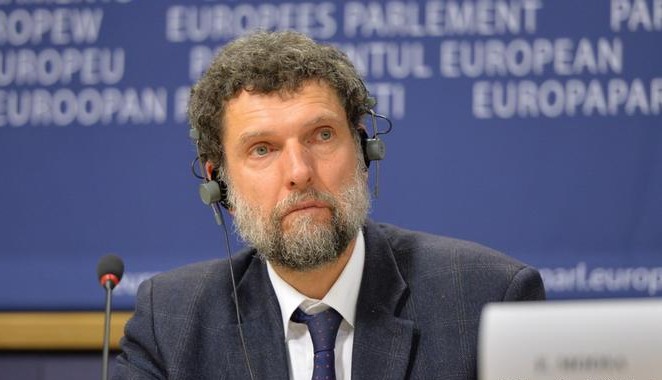The Turkish government has told the European Court of Human Rights (ECtHR) that there was no government influence over the courts that sentenced businessman Osman Kavala to life in prison, while defending its defiance of ECtHR rulings that found violations of his fundamental rights, the TR24 news website reported.
Journalist Gökçer Tahincioğlu on Wednesday shared excerpts from the answers Turkey provided to the ECtHR about the case of Kavala, who has been imprisoned since November 2017 on charges related to the 2013 anti-government Gezi Park protests.
Kavala was sentenced to life in prison in 2022 for allegedly attempting to overthrow the government of then-prime minister and current president Recep Tayyip Erdoğan. His conviction, seen by some as politically motivated, was upheld by the Supreme Court of Appeals in September 2023.
Turkey has refused to release Kavala despite a 2019 ECtHR ruling that found his detention was in pursuance of an “ulterior motive,” that of silencing him as a human rights defender.
In July 2022 the Grand Chamber of the ECtHR also confirmed that Turkey had failed to fulfil its obligations under the European Convention on Human Rights by not releasing Kavala and held that the impugned measures against him were aimed at silencing him and dissuading other human rights defenders.
The non-implementation of the rulings prompted the Council of Europe (CoE) Committee of Ministers to launch an infringement procedure against Turkey in February 2022, which is still ongoing.
Kavala’s lawyers filed another application at the ECtHR in January due to his continued incarceration. The court, which examined Kavala’s application on a priority basis, informed Turkey in March about the application and asked the Turkish government to submit its defense to the court by July 16.
Turkey said it was unable to comply by this date and asked for extra time.
In line with its request, Turkey was given until September 16 to submit its defense and answer 12 questions directed by the Strasbourg court. The defense was written by justice ministry officials and forwarded to the court by the foreign ministry.
The Turkish government said the launch of disciplinary investigations into some judges who ruled for the acquittal of Kavala in February 2020 in the Gezi Park trial and the presence of a former ruling Justice and Development Party (AKP) member among the judges who convicted Kavala had “no negative influence” over the trial. The government said the launch of a disciplinary investigation into judges does not affect one’s right to a fair trial at an independent court, while saying that there is no concrete evidence about the loss of impartiality of the judge who was a former AKP member.
With regard to the question of whether the statements of Turkish government officials and President Erdoğan about Kavala and his trial had affected the course of the proceedings, the government said those statements did not include any elements that would destroy the presumption of innocence on the part of the jailed businessman.
Erdoğan, who has on many occasions attacked Kavala in public, accusing him of masterminding the Gezi Park protests, also called him a “terrorist” when questioned by a Spanish reporter in June.
Despite the claims of the Turkish government about the independence of the courts that tried Kavala, the Turkish judiciary is frequently criticized for acting on orders from Erdoğan and his government, particularly after a failed coup in July 2016, when more than 4,000 judges and prosecutors were purged from their jobs under the pretext of an anti-coup fight.
The mass disbarment of members of the judiciary is believed by many to have had a chilling effect on the entire justice system, intimidating the remaining judges and prosecutors into doing the government’s bidding by launching politically motivated investigations into critics.
In its defense, the Turkish government also claimed that the ECtHR should reject Kavala’s new application because he has a pending application at the Constitutional Court and therefore has not exhausted domestic remedies, a reason for the rejection of applications by the ECtHR.
The government said the workload of the Constitutional Court should be taken into consideration for reviewing Kavala’s application.
A leading figure in Turkey’s civil society, the 66-year-old Kavala was born in Paris, educated in the UK and ran a cultural center before being thrust to prominence. He was accused of financing the Gezi Park protests against Erdoğan’s government in 2013.
The Gezi Park protests began in the summer of 2013 as a reaction to government plans to demolish a park in central İstanbul but quickly escalated into widespread anti-government demonstrations. The protests were met with violent suppression, resulting in the death of 11 demonstrators due to excessive police force.
Kavala’s conviction, along with those of other defendants, has been widely criticized as politically motivated and has drawn significant international condemnation and domestic protest.
